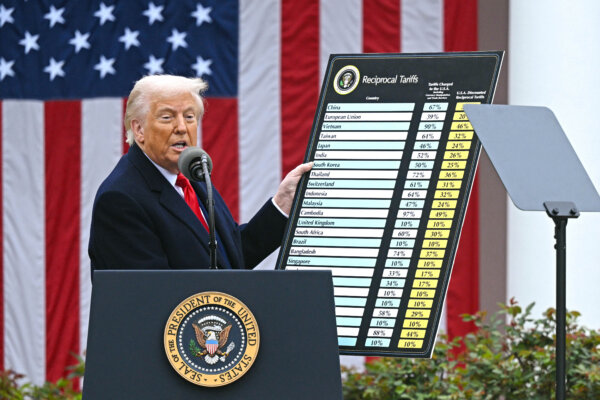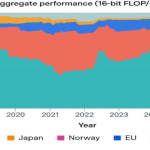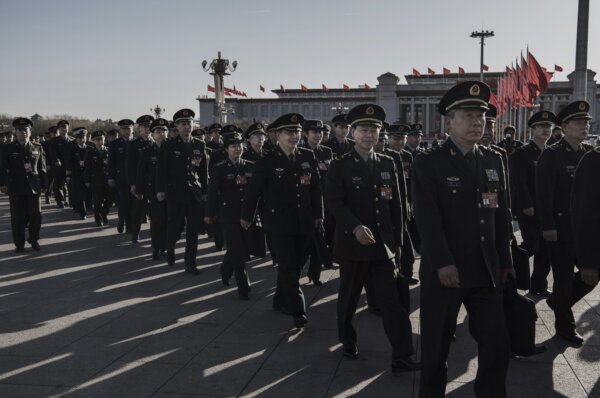![]() A federal court said on May 28 that President Donald Trump exceeded his authority when he declared a national emergency to impose sweeping baseline tariffs on nearly all U.S. trading partners earlier this year.
A federal court said on May 28 that President Donald Trump exceeded his authority when he declared a national emergency to impose sweeping baseline tariffs on nearly all U.S. trading partners earlier this year.
“The Constitution assigns Congress the exclusive powers to ‘lay and collect Taxes, Duties, Imposts and Excises,’ and to ’regulate Commerce with foreign Nations,’” the court ruling states.
That law allows the president to regulate imports, including increased import levies, under extraordinary circumstances, like a national emergency.
Alongside the baseline tariff were reciprocal tariffs up to 50 percent on select trading partners accused of having high tariffs on U.S. imports, non-tariff trading barriers, or substantial trade deficits. Trump called these “Liberation Day” tariffs and said they were necessary to ensure national security, address unfair trade practices, and protect domestic industries.
The plaintiffs, who argued that only Congress has the authority to collect duties on imports, are the attorneys general of Arizona, Oregon, Colorado, Connecticut, Delaware, Illinois, Maine, Minnesota, Nevada, New Mexico, New York, and Vermont.
“By claiming the authority to impose immense and ever-changing tariffs on whatever goods entering the United States he chooses, for whatever reason he finds convenient to declare an emergency, the President has upended the constitutional order and brought chaos to the American economy,” the attorneys general wrote.
Arguing for the businesses, Jeffrey Schwab alleged that Trump had engaged in an unprecedented expansion of executive authority.
Justice Department attorney Eric Hamilton said the International Emergency Economic Powers Act allows the president to not only impose tariffs, but also that his decision was beyond the court’s review.
In its Wednesday ruling, the Court of International Trade said it was granting the plaintiffs’ motion for a summary judgment on the case. Summary judgments are granted if the “[plaintiff] shows that there is no genuine dispute as to any material fact and the [plaintiff] is entitled to judgment as a matter of law.”
The court said granting the summary judgment makes the motion for a preliminary injunction “moot,” since the Trump administration is losing the case on merits, making an injunction unnecessary.
“The court holds for the foregoing reasons that IEEPA does not authorize any of the Worldwide, Retaliatory, or Trafficking Tariff Orders. The Worldwide and Retaliatory Tariff Orders exceed any authority granted to the President by IEEPA to regulate importation by means of tariffs,” the court ruled.
That means Trump’s fentanyl related tariffs, which saw 25 percent levies imposed on Mexico, Canada, and China, earlier this year, are also unlawful in relation to the International Emergency Economic Powers Act (IEEPA).
“The Trafficking Tariffs fail because they do not deal with the threats set forth in those orders,” the court ruled. “Summary judgment will enter against the United States … The challenged Tariff Orders will be vacated and their operation permanently enjoined.”
The court continued, “There is no question here of narrowly tailored relief; if the challenged Tariff Orders are unlawful as to Plaintiffs they are unlawful as to all.”
In response to the ruling, White House spokesman Kush Desai told The Epoch Times that “it is not for unelected judges to decide how to properly address a national emergency.”
“Foreign countries’ nonreciprocal treatment of the United States has fueled America’s historic and persistent trade deficits. These deficits have created a national emergency that has decimated American communities, left our workers behind, and weakened our defense industrial base—facts that the court did not dispute,” Desai said.
The Trump administration said it has appealed the ruling.











